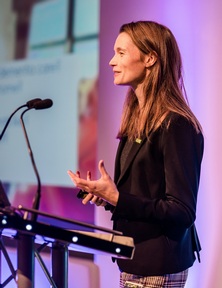Podcast: Care homes can 'sing from the rooftops' safely during pandemic says Music for Dementia director
Many schools and churches have banned group singing due to it being a Covid-risk, but the head of the charity Music for Dementia is urging care homes to continue with communal singing saying it can still be done safely.

On episode 16 of our Let's Talk About Care podcast, Grace Meadows, the charity's programme director claims group singing sessions can be done safely and care homes need to keep "singing from the rooftops" and bringing "people together".
Last year, choirs were found to be responsible for spreading coronavirus, as the virus is spread through droplets in the air. Large droplets such as those in a cough or a sneeze easily spread the virus and smaller droplets such as singing or speaking loudly can also transmit the disease.
This led to many churches and schools banning singing. Many care homes hold group singing sessions as singing is known to be therapeutic and can reduce anxiety and boost memory and concentrations levels.
The benefits of singing for people with dementia are so significant that Music for Dementia worked with NAPA (the National Activity Providers Association and other organisations last year to produce a guide on how to mitigate the risks of singing.
Ms Meadows, who is also a musician and music therapist, said: "We set out parameters based on the science and the research being done. It gave people the confidence to make music happen.
“We have found activity coordinators have been really proactive because they’ve understood how valuable music has been in helping to support people.
“Whether you’re singing from the rooftops or just humming, it brings people together. If there is one thing people have craved for throughout this pandemic is connection."
'Shock' at huge donation
Ms Meadows also talks on the podcast about her "shock" whilst being interviewed on BBC Breakfast last November alongside Alzheimer's Society ambassador Arlene Phillips.
Scottish entrepreneur Sir Tom Hunter appeared on the programme and announced he was going to donate £1m to be split between Music for Dementia and the Alzheimer's Society, after being inspired by a video that had gone viral of Paul Harvey, a composer with dementia, creating a piece based on just four notes.
"What a moment that was. It was a once in a lifetime experience. It was a real shock, but the best kind of shock."
"I was touched on so many levels both professionally and personally because it spoke to the power of how music can really support relationships and keep connections alive regardless of dementia."
The donation of £500,000 will provide grants for organisations providing musical services for people with dementia in the UK.
“What we want to see with this is impact and reach. Reaching as many people living with dementia across the UK. We are calling for all organisations who have experience of delivering music based services for people living with dementia.
"The idea is to help continue their valuable work or help extend it. We know so many charities have been affected by the pandemic they can’t fundraise in the normal way and what we are trying to do is help those organisations keep going, get back on their feet and ultimately support people living with dementia and their carers.
“We hope to start issuing the funding in early to mid-April because we know organisations need that money sooner rather than later.”
Power of the arts to 'transform' people
In the podcast, we also learn that Ms Meadows trained as a bassoonist at music college but was inspired by her brother who has cerebral palsy to look at how the power of the arts can change people's lives.
“I felt like something was missing and the music wasn’t quite connecting me with people. I am a real people person in terms of wanting to collaborate and working together.
“My brother has cerebral palsy and learning difficulties and he has a real issue with self-confidence. I watched what happened to him when he got up on stage and became an actor. He became incredibly confident and fluent in his speech. I thought if that is somebody who is transformed by the power of drama and acting, what happens with music.”
Music for Dementia M4D radio station
Over lockdown, the Music for Dementia free radio station M4D radio became an essential part of people’s lives with the numbers of listeners growing daily.
“We’ve seen a steady growth in our listener base with promotions. We had lovely feedback from one care home last summer who said they were having a day off from Covid with the radio station. We are going to listen to your 60s mix all day, dress up in 60s clothes, eat 60s food and we are just going to have a day off from Covid.
“We saw some lovely increases in numbers over Christmas because we joined up with the Alzheimer’s Society and ran their Christmas carol service on our radio station.”
To listen to our Let's Talk About Care podcast click here
To see the many resources Music for Dementia has to offer, go to: https://musicfordementia.org.uk/about/
Latest News
 29-Jul-24
Dementia Bus gives carehome.co.uk staff insight into life with dementia
29-Jul-24
Dementia Bus gives carehome.co.uk staff insight into life with dementia
 01-Mar-24
Find out the top care homes in 2024
01-Mar-24
Find out the top care homes in 2024
 21-Mar-23
UK's top care homes in 2023 revealed
21-Mar-23
UK's top care homes in 2023 revealed
 03-Jan-23
carehome.co.uk launches free care helpline
03-Jan-23
carehome.co.uk launches free care helpline
 13-Dec-22
5 mins with Emily Whitehurst, chief operating officer for Constantia Healthcare
13-Dec-22
5 mins with Emily Whitehurst, chief operating officer for Constantia Healthcare